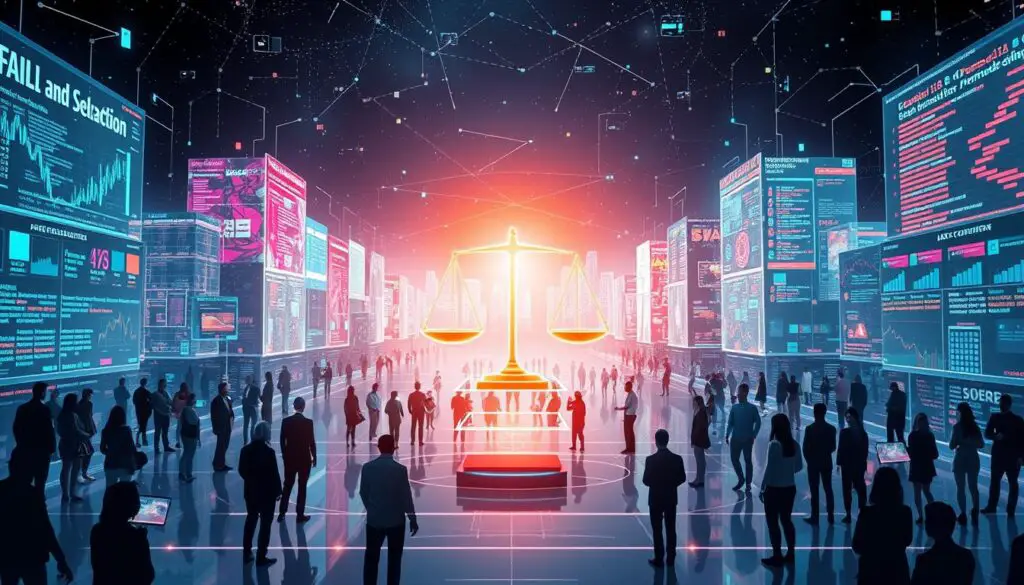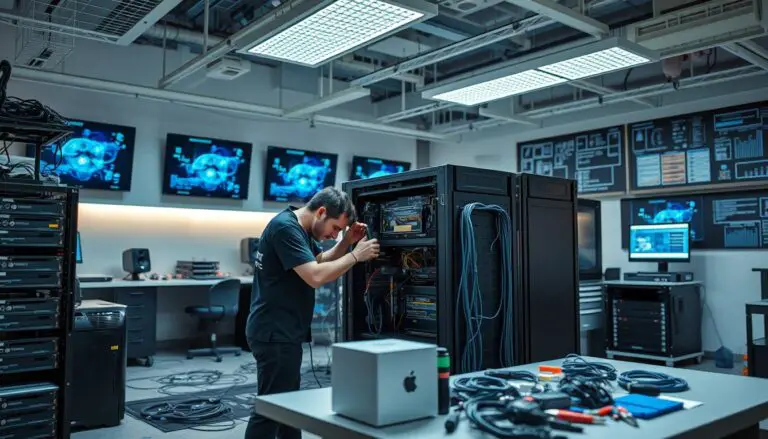
Artificial intelligence (AI) is changing our digital world fast. It brings new things and makes life easier. But, it also raises big questions about keeping our personal info safe.
AI uses a lot of data, and this data grows fast. This means our privacy is at risk. As AI gets better, we worry more about keeping our data safe.
AI collects and uses our personal data in big ways. It can do more with data because it gets better faster. This changes how we think about privacy online.
Many places are taking steps to protect our privacy. Some cities and states don’t let police use certain AI tools. Most people don’t like how AI uses their data, showing they’re worried about privacy.
Rules about privacy are getting better. They talk about how AI makes choices. This shows we need strong ways to protect our data in today’s world.
Key Takeaways
- The amount of data created each day is staggering, with the universe of data doubling every two years.
- AI’s exponential growth in data processing capabilities heightens the importance of digital privacy trends.
- Facial recognition technology has faced bans in several U.S. states due to privacy concerns.
- 81% of consumers are uneasy about how AI might use their personal information.
- Current privacy legislation increasingly focuses on automated and algorithmic decisions rather than explicitly addressing AI.
Introduction to Privacy Concerns in the AI Era
Artificial Intelligence (AI) has grown a lot since the 1940s. It has become part of our daily lives, like automated phone systems and movie suggestions. But, AI’s growth brings big privacy risks, making strong AI rules very important.
The Information Big Bang
Today, we see a huge increase in data thanks to new tech like 5G and quantum computing. This data is key for AI to learn and grow. AI can learn from big data sets, either with human help or on its own.
But, this fast growth in AI data raises big privacy concerns. Deep learning, a part of AI, makes it hard to understand how it works. As AI gets smarter, like with AGI and Artificial Superintelligence, privacy risks grow, needing strong rules.
The Role of AI in Privacy Intrusion
AI plays a big part in privacy issues. It’s used in many areas, like facial recognition and predictive analytics, which can lead to data breaches. A survey showed 34% of people worry about AI/ML security.
AI can also analyze a lot of data, touching on private areas of our lives. It can track us and find personal info, making privacy protection very important. With more AI investments, keeping privacy safe is key.
| Statistic | Percentage |
|---|---|
| Organizations using AI and ML tools for business | 49% |
| Organizations citing ethical/legal AI concerns | 29% |
| Organizations with security concerns about AI | 34% |
| Unaware/uncertain about ethical AI guidelines | 56% |
Understanding AI and Data Privacy
Artificial intelligence has changed our digital world. But, it also raises big questions about data privacy. AI uses personal data from many places to learn and help us. This has led to important talks about keeping our data safe.
How AI Utilizes Personal Data
AI personal data usage is everywhere. It helps make our online experiences better, like music picks and smart home devices. AI looks at data to make smart choices. For example:
- Music and Video Recommendations: Sites like Spotify and Netflix use AI to find music and shows we might like.
- Smart Assistants: Devices like Amazon’s Alexa and Google Assistant use our data to talk to us better.
- Healthcare Innovations: AI in healthcare uses our health data to guess diseases and tailor treatments.
| Sector | Application | Impact |
|---|---|---|
| Entertainment | Content Recommendations | Enhances user experience |
| Smart Home | Virtual Assistants | Personalizes device interactions |
| Healthcare | Disease Prediction | Improves treatment accuracy |
Potential Threats from AI Data Usage
AI has many benefits, but it also has risks. These risks show we need strong data privacy rules:
- Discrimination: AI can make unfair choices if it’s trained on biased data.
- Unauthorized Tracking: Our data can be used for spying, hurting our privacy.
- Data Breaches: AI can be hacked, putting our personal info at risk.
A Pew Research Center survey (2023) found 72% of Americans worry about how companies use our data. Laws like GDPR in Europe and CCPA in California help protect our data. The European Data Protection Supervisor wants rules that put people first in AI.
To fight these risks, companies need to protect our data. They should use encryption, control who can access data, and keep software up to date. Knowing about privacy laws and valuing privacy are key to a safe AI future.
AI Data Collection Methods
AI uses many ways to collect data. These methods help AI work well. Web scraping and sensor data are just a few examples.
Web Scraping Techniques
Web scraping is a big way AI gets data. It pulls data from websites. But, it can raise questions about privacy and who owns the data.
Sensor Data Acquisition
IoT devices make a lot of data for AI. They use sensors to collect this data. This data helps AI make quick decisions in places like smart cities.
Leveraging User Data
User data is also important for AI. It helps make things more personal. But, keeping this data safe is a big challenge.
Role of Crowdsourcing and Public Datasets
AI can use data from many people. Public datasets are also a big help. But, we need to be careful with this data to protect privacy.
Strategic Data Partnerships
Working with other companies can give AI more data. This is good, but we must make sure the data is used right.
Synthetic Data Generation
When real data is not enough, AI can make fake data. This way, AI can learn without hurting privacy. But, the fake data must be good enough.
| Method | Description | Implications |
|---|---|---|
| Web Scraping AI | Extracts data from websites for large-scale datasets | Raises ethical and privacy concerns |
| Sensor Data Acquisition | Uses IoT sensors for real-time data collection | Crucial for real-time decision-making |
| Leveraging User Data | Uses user data to enhance personalization | POSES significant privacy risks |
| AI Crowdsourcing | Gathers data from collective efforts | Enhances data diversity |
| Strategic Data Partnerships | Collaborates with organizations for proprietary data | Requires stringent data governance |
| Synthetic Data Generation | Creates artificial data for model training | Avoids compromising user privacy |
Privacy Challenges in AI Data Collection and Usage
AI is used a lot in collecting and using data. This brings up big privacy challenges. People are worried about how AI affects their personal info. They want clear rules and strong privacy steps.
Data Exploitation Concerns
AI needs a lot of data, which can lead to privacy problems. People are scared, with 63% worried about their privacy with AI. This fear comes from times when personal info was used wrongly.
Challenges of Biased Algorithms
Biased AI algorithms are a big worry. They come from bad or incomplete data. This leads to unfair results. We need to keep checking and fixing AI to make sure it’s fair and right.
Lack of Transparency Issues
Many AI systems are not clear about how they use data. A big 51% of people don’t know how their data is used. We need to be open to build trust and use data the right way.
Surveillance and Monitoring Risks
AI can watch and collect a lot of data. This makes privacy worries bigger. 68% think AI can protect privacy without losing its use. We need rules to keep up with AI and protect privacy.

Data Breaches and Misuses
AI can also lead to data leaks. About 28% of people have had their data used wrongly because of AI. We need strong security to keep data safe. Steps like encrypting data and watching AI systems help a lot.
| Privacy Concern | Percentage of Respondents |
|---|---|
| Data Security | 57% |
| Data Privacy | 48% |
| Algorithm Transparency | 35% |
| Experience of Privacy Breach | 28% |
Regulatory Frameworks for AI and Data Privacy
Regulations like GDPR and CCPA are key in keeping data safe. They make sure businesses handle personal data the right way. But, using AI makes it harder to follow these rules.
To solve these problems, companies need good data plans. They should have clear rules for handling data and strong security measures. It’s also important to teach employees about keeping data safe.
| Aspect | GDPR | CCPA |
|---|---|---|
| Scope | Applies to all EU member states | Applies to businesses in California, USA |
| Objectives | Protect individual privacy, promote transparency | Give consumers more control over their personal information |
| User Rights | Access, rectification, erasure, data portability | Access information, delete data, opt-out of data sales |
| Penalties | Up to 4% of annual global turnover | Up to $7,500 per violation |
The General Data Protection Regulation (GDPR)
The GDPR has strict rules for data in the European Union. It focuses on being open, getting consent, and using data wisely. Companies must design their systems with privacy in mind.
The California Consumer Privacy Act (CCPA)
The CCPA gives California people more control over their data. They can know what data is collected, delete it, and choose not to sell their data. This law makes companies open about how they use data.
Following rules like GDPR and CCPA is a big job. Companies need to check their data, do audits, and plan for when things go wrong. They must find a way to be innovative while following the rules.
What individuals can do to protect their privacy in a world of growing AI surveillance
AI technology is growing fast. People need strong ways to keep their privacy safe. Here are some steps to help protect against AI surveillance:
First, know what data you share online. Check your privacy settings on social media, apps, and websites often. Sharing less personal info online helps avoid AI misuse.
Second, use privacy tools to help defend against AI. VPNs, encryption, and anonymous browsers protect your data online. Some people also use fake data and special privacy methods to hide their real info.
Third, support stronger privacy laws and data rights. Back organizations and policies that value privacy. This helps create rules that keep your data safe and private.
AI surveillance is big worldwide, with 75 out of 176 countries using it. This shows we must act now to protect our privacy.
- Review and manage digital footprints regularly. Adjust privacy settings and minimize personal data exposure.
- Utilize privacy-enhancing tools. Incorporate VPNs, encryption, and anonymous browsing techniques.
- Advocate for stronger privacy regulations. Support policies and organizations that enforce user data control and transparency.
AI brings risks like data leaks and biased algorithms. We must be careful with our privacy. Working together, we can protect our info in the AI world.
Implementing Data Anonymization in AI Development
Keeping privacy in AI development is very important. Data anonymization techniques help a lot. They make sure personal data is safe while still being useful.
Many people worry about data privacy. A Cisco study shows over 90% think AI needs new ways to handle data. A Deloitte survey also shows people are worried about data, which stops AI from being used more.
A Cisco survey found 48% see AI as helpful in many areas. But, 62% of people are still worried about their data. This shows how important data anonymization techniques are for trust.
Companies are also working hard to keep data safe. They are setting up rules, watching laws, and checking their data. These steps help keep AI safe and follow new privacy rules.
Here’s a table showing why data anonymization techniques are key in AI:
| Survey Findings | Percentage |
|---|---|
| Belief that generative AI requires new data strategies | 90% |
| Concerns hindering AI implementation | Ongoing |
| Recognition of AI benefits in multiple sectors | 48% |
| Consumer concern about data handling | 62% |
| Establishment of governance frameworks | Top Action |
| Monitoring regulatory requirements | Key Action |
| Internal data assessments | Important Action |
In short, data anonymization techniques are crucial for privacy in AI development. They help build trust and make sure data is used ethically. As AI becomes more common, using these methods is key for safe and responsible AI.
Addressing Algorithmic Bias
AI systems can have biases because of the data they use. We need to make sure the data is fair and diverse. This way, AI can be more just for everyone.
Ensuring Data Sets Are Inclusive
Having diverse data is key for fair AI. Self-driving cars, for example, struggle to see dark-skinned people. This shows how important it is to include all kinds of data.
Facial recognition AI often gets people of color wrong. Mortgage algorithms also charge more to Black and Latino borrowers. These examples show we need to make sure our data is fair.
To make AI data fair, we must use data from all kinds of people. A survey found many leaders want to make AI fairer. But, we need to act now to fix these biases.

Minimizing Algorithmic Discrimination
We must design AI to avoid biases. In finance, some AI systems charge more to certain groups. We need to fix this to make things fair.
Even though many leaders want fair AI, biases still exist. Facial recognition and self-driving cars show us how important it is to fix these issues. The government is also paying attention and wants us to act.
To reduce biases, we can use fairness checks and audits. Using diverse data is also crucial. By doing this, we can build trust in AI.
Ensuring Transparency and Accountability
Making AI systems clear and accountable is key to building trust. Machine learning models, like generative AI, are getting more complex. They are hard to understand, like a black box.
XAI (Explainable AI) helps make these systems clearer. Rane et al. (2023) showed that XAI makes financial decisions more transparent. This shows how important it is to know how AI works.
Understanding AI Decision-Making
AI transparency is more than just showing code. It’s about making AI decisions clear and fair. It also means explaining data use and avoiding biases.
The European Union’s GDPR says users have the right to know how AI makes decisions. Good data governance is key to AI transparency and trust.
Providing Users with Data Control
Users need control over their data. This means giving them strong rights and tools. It helps address concerns about data rights and builds trust in AI.
Laws like the EU AI Act and the National Artificial Intelligence Initiative Act of 2020 are important. They ensure AI is fair and ethical. This creates a trustworthy AI world.
FAQ
What is the significance of AI privacy protection in today’s digital era?
AI privacy protection is key today. AI uses lots of personal data, which can lead to data breaches and tracking without permission. It’s important to protect our personal info from being misused.
How does the “Information Big Bang” impact data privacy?
The “Information Big Bang” means more data than ever before. This is thanks to 5G and quantum computing. But, it also means more privacy risks, so we need strong privacy rules.
What are the privacy risks associated with AI data expansion?
Big risks include data getting into the wrong hands and being used unfairly. AI also makes it easier to watch and track people. This is true for things like facial recognition and predictive policing.
How does AI utilize personal data?
AI collects data from many places like the internet and smart devices. It uses this data to learn and make things better for us. This helps AI make smarter choices.
What are the potential threats from AI data usage?
Threats include data being used wrongly and AI making unfair choices. There’s also a risk of data being stolen. These issues need careful watching and strong rules to protect our privacy.
What techniques are involved in AI data collection?
AI collects data in many ways. It uses the internet, smart devices, and even crowdsourcing. It also partners with other companies and creates fake data to fill gaps.
How can regulatory frameworks like GDPR and CCPA mitigate AI privacy risks?
GDPR and CCPA help by making data handling clear and fair. They make sure we know how our data is used. This helps keep our data safe from AI risks.
What can individuals do to protect their privacy from AI surveillance?
We can share less data online and use tools to protect it. We should also push for better privacy laws. Knowing our data rights helps us control our info better.
How does data anonymization help in AI development?
Data anonymization removes personal info from data sets. This lets AI developers use data without hurting privacy. It’s a way to keep AI innovative while protecting our privacy.
What steps should be taken to address algorithmic bias in AI systems?
To fix bias, use diverse data and design AI with fairness in mind. Always check AI for fairness. This makes AI fair and unbiased for everyone.
Why is ensuring transparency and accountability in AI important?
Being open about AI helps build trust. It lets users understand how AI works. Giving users control over their data is key for a safe digital world.




Nice Info !!